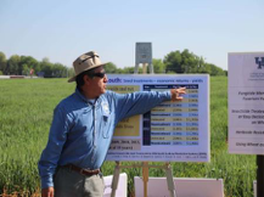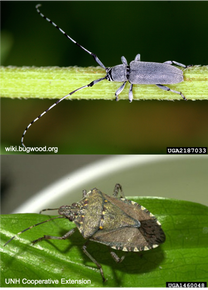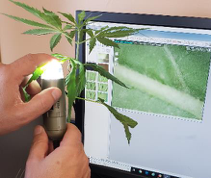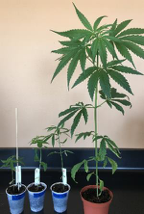 Fig. 1 Dr. Villanueva presenting at an extension field event. Fig. 1 Dr. Villanueva presenting at an extension field event. Written by: Maria Cramer and Veronica Yurchak In academia it’s fairly common to become an expert in a tiny slice of science. Researchers often become incredibly familiar with the particular system or organism they study and may not have too many reasons to branch out. That is not the pattern that Dr. Raul Villanueva, from the University of Kentucky, followed, however. Dr. Villanueva, the field crops entomologist for Kentucky, attributes his diversity of study areas to working in agricultural extension. In order to help support and educate Kentucky farmers he ends up working on whatever insect problems they are facing. And what’s more, Kentucky is a state of diverse agricultural production, ranging from grain crops like wheat, corn, and soybeans, to hemp for CBD production, sweet sorghum for molasses, and many horticultural crops like fruits and vegetables. Over the course of the seminar talk that he presented to the University of Maryland Entomology Department, Dr. Villanueva took the audience on a journey through his extension research program. Industrial hemp is one newly important crop for Kentucky farmers. Grown for medical use, rather than recreational use or for fiber, this is a new crop for Kentucky and there are many unknowns related to its cultivation. As part of a project focused on optimizing hemp production for Kentucky farmers, Dr. Villanueva tackles the arthropod pests that jeopardize hemp production. Mites are one of the main arthropod (not insect!) hemp pests, and Dr. Villanueva’s background specializing in mites in citrus and apple orchards set him up well to figure out best practices for Kentucky farmers who need to manage this pest (Fig. 2). Before he came to Kentucky, Dr. Villanueva studied environmentally friendly ways to control pest mites by using predatory mites and reducing harsh insecticides. Optimizing agriculture for Kentucky farmers came up again with winter wheat production. Winter wheat is sometimes challenged by a disease called Barley Yellow Dwarf Virus (BYDV) which is transmitted to plants by aphids that feed on the wheat in spring. Wheat growers who get their recommendations for controlling BYDV from states farther south often hear that neonicotinoid-treated wheat seed helps control the aphids that vector the disease. However, in Kentucky, the window of activity for the neonicotinoids is too small to actually help, and the aphids are best controlled by going out in the field in the spring to check for them, and then spraying an insecticide if they are present in high enough numbers. Because of this mismatch of information, Dr. Villanueva is jumping in to try to get more regionally appropriate guidance to Kentucky wheat growers to help them cut back on unnecessary seed treatments and achieve better pest control with less negative impact on the environment. Another fairly Kentucky-specific area of extension outreach is working with the Amish community, who have found a niche market in western Kentucky growing sweet sorghum for molasses. With help from two graduate students, Dr. Villanueva and his team were able to develop a strong relationship with members of this community, primarily by assisting them in gaining control of the sugarcane aphid, a yield-reducing pest of sweet sorghum that has become increasingly problematic since its introduction to the US in 2013.  Fig. 3 Adult soybean stem borer (top) and adult brown marmorated stink bug (bottom). Fig. 3 Adult soybean stem borer (top) and adult brown marmorated stink bug (bottom). Considering all the many entomological topics Dr. Villanueva deals with, it is hard to believe there are any specific issues that would stand out among the rest. However, as the extension entomologist technically assigned to field crops, there are two pests Dr. Villanueva spends much of his time researching. Those two pests are the soybean stem borer, Dectes texanus, and the brown marmorated stink bug, Halyomorpha halys (Fig. 3). A native tunneling pest of soybeans with many alternative weedy host plants, the soybean stem borer is a particularly difficult pest to control. Equally as difficult to control, the brown marmorated stink bug is a pest of almost everything, from corn and soybeans to fruits, vegetables and even ornamental plants. Much of his research on these two pests focuses on identifying biological control agents (mostly insect predators and parasitoids) that can naturally control populations of each of these pests. Additional research also focuses on characterizing the specific damage caused by both the soybean stem borer and brown marmorated stink bug in western Kentucky, as well as on identifying potential chemical and/or cultural control methods to help Kentucky growers. With a career that involves becoming an expert in a little bit of everything, it makes sense that Dr. Villanueva would offer a graduate course offering just that. In 2018-2019, he co-taught an international topic seminar through the University of Kentucky titled “Agriculture Entomology Study Abroad: Peru” where graduate students learned about the sustainable agricultural practices, insect biodiversity, and ecological diversity of the two contrasting production regions of the Andean plateau and the Amazon rainforest. Because Dr. Villanueva grew up in Peru, a country with notably increased agricultural exports, he is able to offer unique insights and connections for traveling and studying there. In a post-COVID world, these trips will resume and interested graduate students or faculty collaborators are encouraged to get involved! From assisting newly permitted hemp producers to aiding Amish sorghum growers, Dr. Villanueva’s work highlights the fact that working as an extension entomologist really does require a person to be an expert in a little bit of everything! Veronica Yurchak is a PhD student in Cerruti Hooks’ Lab studying non-chemical alternatives to weed and insect pests in grain and vegetable crops. Maria Cramer is a PhD student in Kelly Hamby’s Lab studying the impacts of insecticides and RNAi on beneficial insects in field corn. Comments are closed.
|
Categories
All
Archives
June 2024
|
Department of Entomology
University of Maryland
4112 Plant Sciences Building
College Park, MD 20742-4454
USA
Telephone: 301.405.3911
Fax: 301.314.9290
University of Maryland
4112 Plant Sciences Building
College Park, MD 20742-4454
USA
Telephone: 301.405.3911
Fax: 301.314.9290



 RSS Feed
RSS Feed




